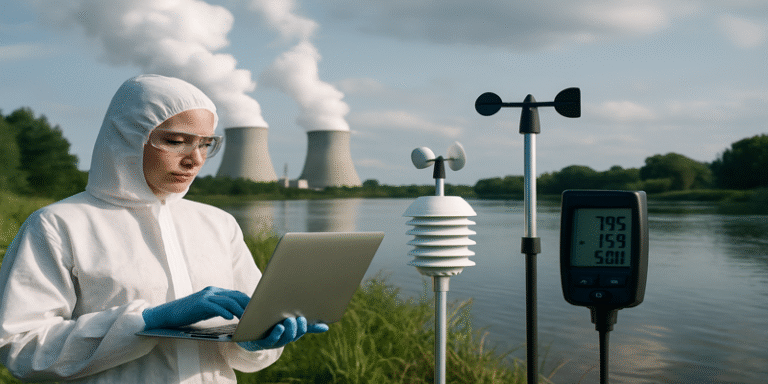Environmental science is an interdisciplinary academic field that integrates biological, physical, and information sciences to study the environment and provide solutions to environmental problems. As human influence over natural systems grows, environmental science becomes central to ensuring a sustainable future. This article presents a general overview of the key topics within the field, drawing on textbooks, peer-reviewed journals, and reputable websites to provide insight into the subject’s scope and complexity.
1.0 Climate Change and Global Warming
One of the most pressing issues in environmental science is climate change, which refers to long-term shifts in temperatures and weather patterns. While these changes can be natural, human activities—particularly the burning of fossil fuels—have been the main driver since the 20th century (IPCC, 2021). The Intergovernmental Panel on Climate Change highlights the role of greenhouse gases (GHGs) such as carbon dioxide (CO₂), methane (CH₄), and nitrous oxide (N₂O) in warming the planet.
The implications of climate change include rising sea levels, extreme weather events, ocean acidification, and loss of biodiversity. Scholars such as Robinson et al. (2025) emphasise the importance of global collaboration to address these impacts through mitigation and adaptation strategies.
2.0 Pollution and Waste Management
Environmental pollution is a long-standing concern in environmental science. It includes air, water, soil, and noise pollution, each with detrimental impacts on health and ecosystems. Industrialisation, urbanisation, and unsustainable agriculture are major contributors to these issues.
A contemporary development in this area is the focus on microplastics, which are now found in nearly all ecosystems on Earth. Waste management practices, especially the 3Rs (Reduce, Reuse, Recycle), are crucial in addressing the escalating solid waste problems, especially in urban areas (Gorain et al., 2025).
3.0 Renewable Energy and Sustainable Technology
Renewable energy is a key topic in environmental science due to its potential to reduce GHG emissions. Sources like solar, wind, hydroelectric, and biomass are increasingly used to replace fossil fuels. Technological innovation, such as solar-powered desalination systems, shows promise in solving the global water crisis (Alasadi & Hammadi, 2025).
The integration of smart grids, energy storage systems, and green building technologies are also under active research for improving energy efficiency and resilience (Meskini et al., 2025).
4.0 Biodiversity and Conservation
Biodiversity, the variety of life on Earth, is essential for ecosystem stability and resilience. However, habitat destruction, overexploitation, pollution, and climate change are driving species extinction at alarming rates. Conservation strategies such as protected areas, restoration ecology, and community-led conservation are vital responses.
Fox (2025) presents a compelling example through the restoration of native bird species in New Zealand, combining ecological data and indigenous knowledge.
5.0 Water Resources and Hydrology
Water is fundamental to life, yet over 2 billion people live in water-stressed regions (UN-Water, 2022). Hydrology, the study of water in the environment, is central to understanding floods, droughts, and groundwater systems.
Water footprint analysis, recently explored by Guzmán-Dimas et al. (2025), evaluates water use across industries and informs sustainable water management practices.
6.0 Environmental Policy and Governance
Environmental science is deeply connected to policy-making. Environmental governance refers to the regulations and institutions that influence environmental actions. National governments and international bodies like the United Nations Environment Programme (UNEP) play a vital role in shaping global sustainability efforts.
Studies show that Environmental, Social, and Governance (ESG) frameworks are being increasingly adopted by businesses to ensure corporate sustainability (Luthia et al., 2025).
7.0 Human Health and the Environment
There is a growing understanding of the links between environmental quality and public health. Air and water pollution are linked to respiratory diseases, cancer, and waterborne illnesses. The emergence of zoonotic diseases, like COVID-19, also shows how environmental degradation influences human health (Carr et al., 2025).
8.0 Environmental Education and Behavioural Change
Changing individual and societal behaviour is essential for achieving environmental goals. Environmental education helps build awareness, attitudes, and skills needed for responsible environmental decisions. Programmes such as eco-schools, citizen science, and youth activism are gaining popularity as tools for grassroots change.
The role of integrated environmental education curricula is explored in detail by Meskini et al. (2025), highlighting its impact on water conservation behaviour among youth.
Environmental science is a vibrant and evolving field, addressing the interconnected challenges of our time. From tackling climate change to conserving biodiversity, the discipline draws on diverse scientific, technological, and social insights. The topics covered—climate, pollution, energy, biodiversity, water, policy, health, and education—are not isolated but interdependent, requiring transdisciplinary solutions. As the planet faces escalating environmental pressures, the role of environmental scientists, educators, and informed citizens has never been more critical.
References
Fox, M. (2025). An integrative approach to ōi/grey-faced petrel restoration in Te Wao Nui a Tiriwa/Waitākere Ranges. University of Auckland Repository.
Gorain, S., Dutta, S., Balo, S., et al. (2025). Harnessing green wealth: A two-decade global assessment of forest carbon sequestration and credits. Journal of Environmental Management.
Guzmán-Dimas, A., Torres, Y.S., Vega, R. (2025). Water Footprint and SDGs. Cleaner Environmental Systems.
Luthia, M., Bindra, S., Padhi, A. (2025). Evolution of ESG Research. Emerald.
Meskini, N., Adib, Y., Yari, J. (2025). Integrated Curriculum for Water Use. IASE Journal.
Alasadi, A.I., Hammadi, S.H. (2025). Solar-Powered Desalination Review. ResearchGate.
Robinson, C., Hobday, A.J., Murphy, E.J., et al. (2025). Ocean Sustainability under Global Change. Frontiers in Marine Science.
Carr, R.L., Chan, V., West, N.C., et al. (2025). Environmental Health and Research Return Systems. i-JMR.









